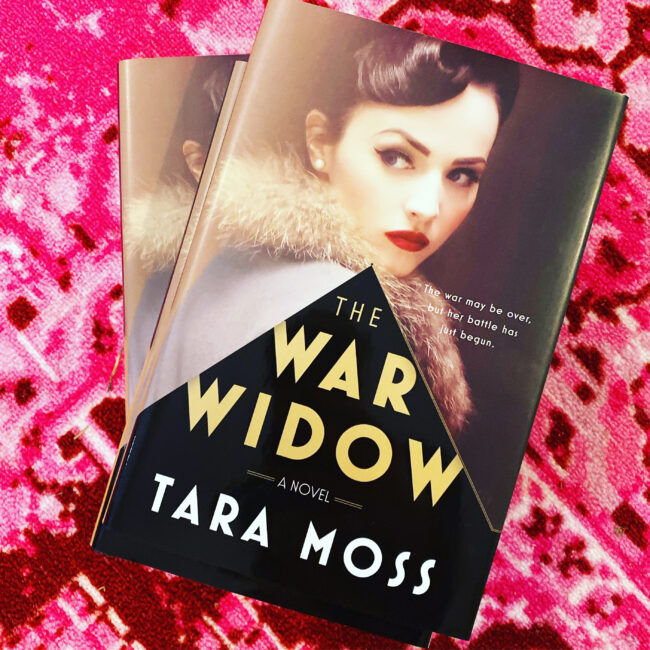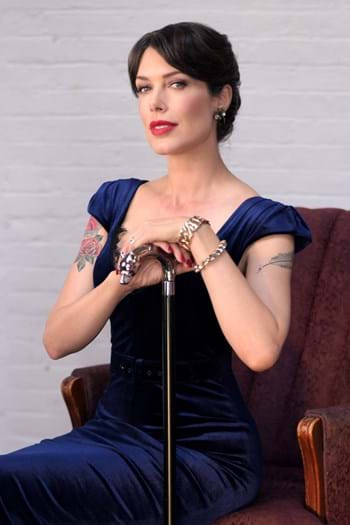
The intersection between sewing and fiction can be wonderfully rewarding. With the Murder Mystery Quilt, I’ve been indulging my love of mysteries and crime novels for the past six years, which means any time I’m reading, I can call it “research,” because I am a professional. That is how that works.
It’s also led me to new authors and detective characters that I never read before, new ideas for how to format a mystery, and a new appreciation for the many ways that the basic drives of any human can be illustrated through fiction to give us insight into how alike we all are at the core. In short, my thought life has been ON FIRE these past six years because I keep feeding it puzzles that remind me that we’ve all got a lot in common at the core.
Not many of these allow me to simultaneously indulge my love of The Fiber Arts, though. I mean, Miss Marple knits, but int he world of detective novels, there isn’t a lot of seam ripping.
So when author Tara Moss’ publicist contacted me and invited me to interview Moss in advance of the release of the first novel in a new series, I was instantly intrigued–it got better when I learned that not only was it a period novel set in Australia during World War II, but that the protagonist is a female detective with a ton of moxie and some fierce skills with a needle–she sews her own wardrobe AND fights crime??? I’m in.
The character is Billie Walker, and she’s roundly developed and engaging from the very first page. Given Tara Moss’ background not only as a UNICEF ambassador and advocate for the rights of women and children, but also her legitimate academic credentials as a current PhD candidate in Gender & Cultural Studies, that’s not super surprising–the book is well-plotted, filled with visual imagery, and a fun read to boot.
The publicist was kind enough to send copies to me to give away–we’re drawing names from the members of the 2021 Murder Mystery Quilt and shipping a crisp hardback copy off to them this month! In the meantime, you can read the interview with Tara below, and find The War Widow, the first Billie Walker novel, on Amazon.

You’re well known and critically acclaimed for the depth of research you do for your novels, going so far as getting set on fire and gaining certification for snake handling. How did you approach researching an historical novel set in WWII Australia differently than your previous crime novels?
Immersion into the fine historical details of WW2 and the postwar 1946 setting remains a delightful but difficult task, as I write my second Billie Walker novel now. It’s everything from pouring over books, documentaries, family histories and news articles from the time, to looking at the social and political fallout from the war, examining 1940s fashions, rationing, make do and mend, and the widespread inequalities of the era – many of which resonate a little too strongly today. 99% of the locations in this novel are also real places I was able to visit and explore, from Central Police Station to the Hydro Majestic, so being on the ground (pre-COVID) in these locations was a must. And of course, as a sewist myself, I made 1940s garments, like Billie Walker does, and wear and surround myself with many of the authentic items of the day, as a way of further connecting with the period. The research is endless really, so I will leave it there!
Our Murder Mystery Quilt members read a mystery one chapter at a time each year, and sew a quilt block where the clues are hidden in the quilt to solve the crime–but there has been some criticism that in today’s world, a story based around a murder is insensitive. What do you think is the enduring appeal of the crime or mystery novel? Is it offensive to create entertainment centered around murder in a world where gun control is such a serious issue?
Violence must be discussed, written about, contemplated and woven into our story telling. As a survivor of violence myself, I strongly believe this. Silence and censorship is not the answer here, and in fact much can be achieved through openness and changing perspectives one story at a time. I have dedicated the past 21 years of my life to entering women and girls in my storytelling, and I think that shifts the viewpoint and helps challenge stereotypical tellings and dehumanization of victims and survivors of crime. In fact, I am drawn to the crime genre in part because of the opportunity to focus on social issues like inequality, sexism, racism, ableism, class and violence. Hardboiled has a long tradition of tackling some of these issues, albeit from an almost exclusively male perspective. Subverting that noir tradition with a female protagonist has value, and makes for a refreshing read.
Your first novels were published before you hosted television and documentaries. Has working through film as a presenter influenced or altered your writing style at all?
I don’t think documentary writing and presenting has altered my novel writing, per say, except in that everything I experience alters me by forcing me to grow and to learn, and therefore is brought to my work in some way. Whether it is my documentary on cyberhate or on unsolved homicides, I always learn a lot about the subjects I present to the world, and those lessons are ongoing. I wouldn’t have it any other way.
Billie Walker is a strong female character who is vocal about her feminist views–but who lives and works in a world where her appearance and dress are still a factor in how she’s perceived. Speaking to our audience of dressmakers, who sew clothing primarily for themselves as a means of creative expression, how do you interpret the relationship between fashion and feminism?
Self-expression is a joy and a privilege, in my view, and I chose to express myself in many ways, including through dress. My PI character Billie Walker has different pressures, however. She must dress the part to slide into high society or ‘dosshouses’ and back alleys depending on where her work takes her. Her Fighting Red lipstick is a kind of armour for her, as it was for many women during the 1940s, and she sews her own clothes for pleasure, but also out of necessity. It’s work for her, social pressure, and need, as well as personal expression and identity.
Fashion and presentation can be art, and the world is far better with art in it. (I’m sure Billie Walker would agree with that.) Sewing is an amazing skill, as is dressmaking and other crafts and creation. I value style and creative expression over fashion, though, if we consider ‘fashion’ to be the commercially driven industry, and style to be something more artistic or individual. I am also passionate about sustainability and vintage, second hand and salvaged clothing. There are so many beautiful fabrics and garments out there that need to be cherished, worn and enjoyed – garments that were made to last.
In short, ‘feminized’ skills, occupations and interests have often been devalued and dismissed, and I won’t be part of that. Feminism and personal style are not at odds in the slightest.
Combining a private investigator license with a graduate degree in Gender & Cultural Studies is unusual; can you describe an example of a time when your experiences combining those disciplines gave you a unique insight?
Everything we learn gives us new insights, and there simply isn’t enough time in one life to experience all I wish to. Gender and Cultural studies provides valuable insights into gendered experiences and the history of social, political, legal, medical and financial inequality based on sex, race and cultural difference, and that is very relevant to the sort of thing you come across in private investigation work. These insights provide extra layers of knowledge into human relations, domestic or family violence and abuse, and more.
When writing a character in a period novel who is openly feminist, how does your experience as a UNICEF Ambassador for women and children work its way into your plot?
My UNICEF work, and all of my advocacy on women’s rights, disability rights and more, finds its way into my work because those stories are fascinating and they need telling. The horrific real impacts of war on regular citizens is one of the things I have learned about through my UNICEF role, visiting refugee camps and speaking with women and children impacted by war. This has further motivated me to focus my writing on the impacts of war on regular citizens, rather than politicians and generals, and those in power.
The War Widow was shortlisted for the Danger Prize this year; what are your plans for Billie Walker moving forward? What does this character have to say to contemporary readers?
I am writing the second Billie Walker novel now, which will follow on from events in The War Widow, and I plan to continue her story for at least two more books. In terms of what Billie Walker says to contemporary readers, I feel that the issues raised in these novels resonate strongly today, even though they are set in the late 1940s. I chose this era in part because it shows just how far we’ve come – and how far we still have to go.
Huge thanks to Tara Moss and her staff for making this interview possible! You can order the US edition of Tara’s newest novel through Amazon, and follow her author page for updates on the next Billie Walker novel.

